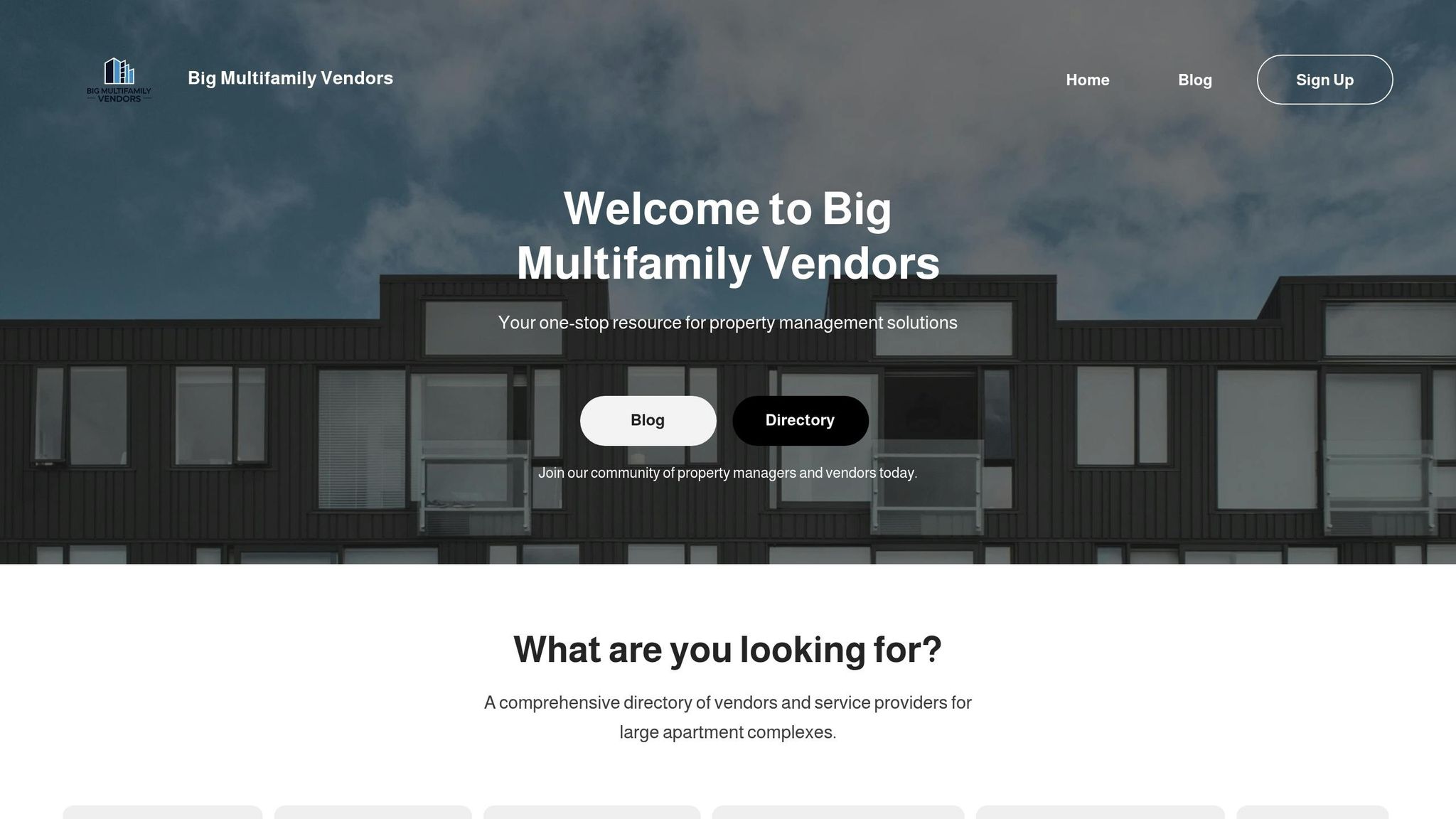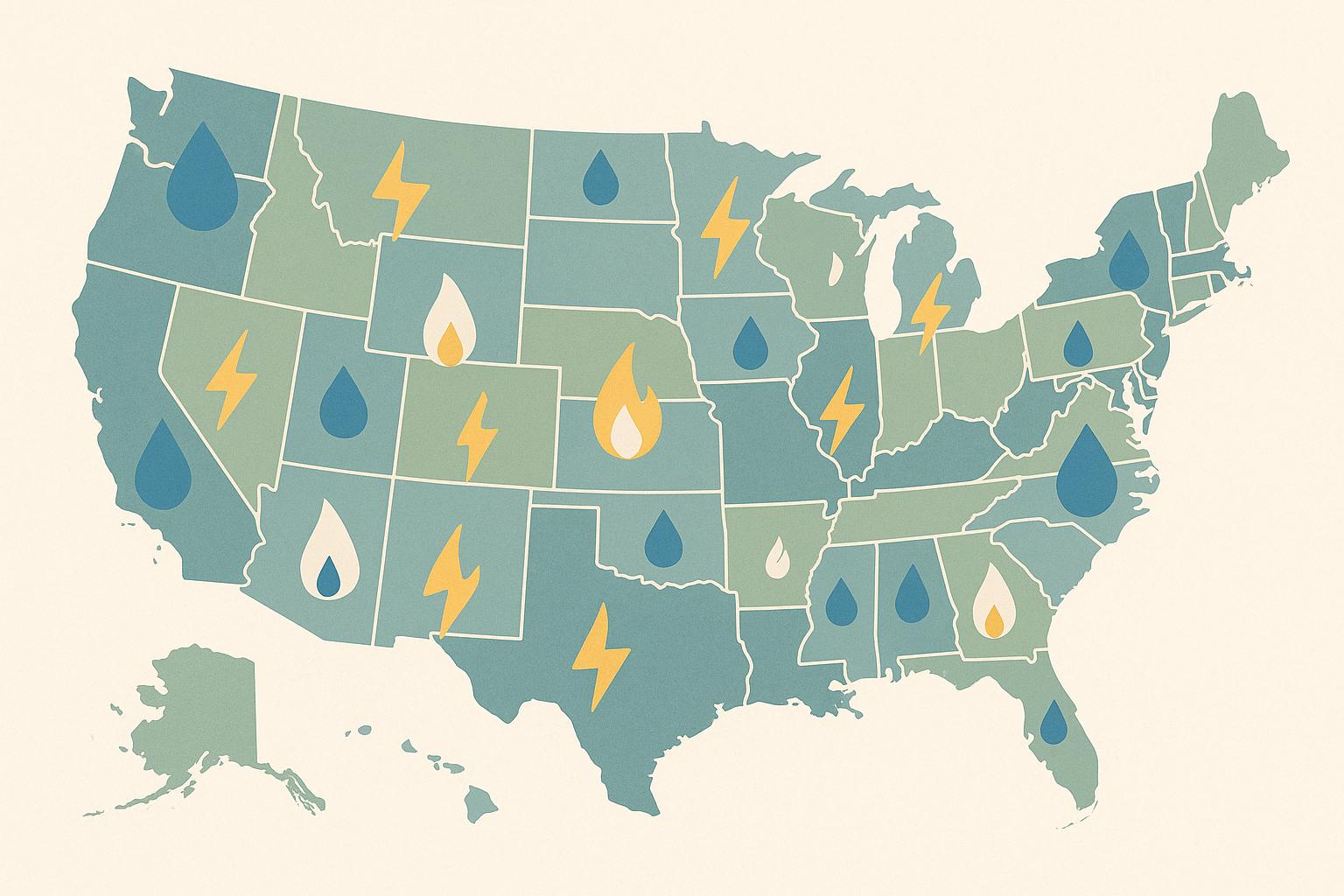A solid HVAC maintenance contract is key to keeping tenants happy and protecting your HVAC systems from costly breakdowns. Here's what you need to know upfront:
- Why it matters: HVAC issues make up 80% of tenant complaints. Regular maintenance can cut energy costs by 5–20%, reduce maintenance requests by up to 50%, and extend system lifespan by 5–8 years.
- Key contract terms to check:
- Response times: Ensure clear timelines for urgent and non-urgent issues.
- Emergency procedures: Define what qualifies as an emergency and any extra fees.
- Warranties: Understand coverage for parts and labor, and check for exclusions.
- Included services: Confirm what’s covered - inspections, repairs, cleaning, etc.
- Tenant access rules: Outline notice requirements and emergency access protocols.
- Types of contracts: Choose from Standard, Preventative, or Comprehensive plans based on your property’s needs and budget.
| Contract Type | Coverage | Annual Cost | Best For |
|---|---|---|---|
| Standard | Basic inspections and filters | $150–$500 | Newer systems |
| Preventative | Scheduled visits, part replacement | $150–$300 | Aging systems |
| Comprehensive | Emergency repairs, labor, parts | $300–$500+ | Older systems needing full coverage |
Tip: Look for contractors specializing in multifamily properties and use peer reviews to find reliable partners. Proper planning now can save you thousands in the long run.
HVAC Service Training - Maintenance Agreements 101
Important Contract Terms to Review
Taking a close look at contract details can help you avoid surprises and extra costs down the line. Here are some key areas to focus on to ensure your agreement provides the coverage you need and minimizes risks.
Response Times and Service Hours
One of the most common gaps in maintenance contracts is vague or missing response time commitments. Many HVAC vendors don’t guarantee specific response times in preventive maintenance agreements [1]. To avoid this, set clear, priority-based timeframes. For instance, a serious system failure might require a 2-hour response and a 4-hour resolution, while less urgent issues could allow for a 24-hour response window [3].
Make sure the contract also specifies:
- Standard business hours
- Any additional charges for after-hours service
- Steps for escalating issues if response times are missed [2] [3].
Emergency Repair Procedures
Emergencies can lead to confusion if the contract doesn’t clearly define what qualifies as urgent. The agreement should outline specific situations that activate emergency protocols [4]. It should also include:
- Who to contact in an emergency
- The information you’ll need to provide
- Expected response times and escalation options if the primary contact is unavailable
Don’t forget to confirm whether there are extra fees for emergency services and ensure the procedures include regular updates on repair progress and completion timelines.
Parts and Labor Warranties
Understanding warranty terms is essential. Check what the contract covers for parts and labor, and look for any exclusions or limitations [4]. Some contractors offer broad coverage, while others may restrict warranty periods or exclude specific components.
Ask about common exclusions, such as issues caused by tenant misuse, environmental conditions, or normal wear and tear. Reviewing the contractor's history with warranty claims can also give you insight into potential out-of-pocket expenses [4].
What Services Are Included
The services outlined in the contract largely determine its value. Carefully review what’s included, such as inspections, testing, cleaning, parts replacement, and emergency repairs. Confirm whether fees are flat-rate or based on individual services.
It’s also important to define tenant responsibilities, like changing filters or ensuring unit access, to avoid delays [4] [5]. Work with your provider to set a service schedule that fits your system’s needs - newer units may require less frequent maintenance, while older systems might need more attention.
Property Access and Tenant Notice Rules
Clearly outline how and when tenants will be notified about maintenance visits. For non-emergency visits, a 24–48 hour notice is typically required. The contract should also specify conditions under which emergency access is allowed without prior notice, as well as any special access requirements, like key codes or security protocols.
Different Contract Types and Service Levels
Choosing the right HVAC maintenance contract is key to ensuring your property's heating and cooling systems remain efficient and reliable. Each contract type caters to different needs, offering varying levels of coverage - from basic upkeep to all-inclusive protection.
Contract Type Comparison
There are three main types of HVAC maintenance contracts: standard, preventative, and comprehensive [6]. Your choice will depend on factors like your property's age, the complexity of your HVAC system, and your budget. Here's a closer look at what each option entails.
Standard service agreements focus on routine care, including inspections, filter changes, system checks, and minor repairs [6]. These are well-suited for newer properties with dependable HVAC systems that don't demand intensive maintenance.
Preventative maintenance agreements go a step further by including scheduled visits, detailed inspections, and replacement of worn parts to help prevent system failures [6]. These contracts are especially useful for aging systems, as they can reduce HVAC breakdowns by up to 95% and cut energy consumption by 15% to 20% [7].
Comprehensive service plans offer the broadest coverage. They typically include emergency repairs, parts replacement, and sometimes even labor costs [6]. Although these plans require a higher upfront investment, they can save money in the long run. For context, HVAC repairs generally cost between $225 and $1,400, while emergency repairs can be 50% to 100% more expensive than standard service calls [7].
| Contract Type | Service Inclusions | Typical Annual Cost | Best For |
|---|---|---|---|
| Standard Service Agreement | Routine inspections, basic maintenance, filter changes, minor repairs | $150 - $500 | Newer properties with reliable systems |
| Preventative Maintenance Agreement | Scheduled visits, thorough inspections, worn parts replacement | $150 - $300 | Properties with aging systems |
| Comprehensive Service Plan | Emergency repairs, parts replacement, labor costs, priority service | $300 - $500+ | Older properties or those needing full coverage |
Some providers also offer tiered plans, like Bronze, Silver, and Gold, which add benefits such as more frequent tune-ups, extended warranties, or faster response times as you move up the tiers.
When deciding on a contract type, think about your property's specific needs. Newer systems might only need a standard agreement for basic upkeep, while older properties or those with multiple aging units often benefit from comprehensive plans. These plans not only help avoid costly emergencies but also extend the lifespan of your equipment - making them a smart investment for properties requiring more intensive care.
Once you've determined the level of coverage you need, compare pricing to find the best fit for your budget and requirements.
sbb-itb-58157f8
Pricing and Payment Terms
Understanding the financial details of your HVAC contract is just as important as knowing the operational terms. Having a clear grasp of the pricing structure ensures you're prepared for costs and can avoid unpleasant surprises. While many contracts follow standard payment setups, the specific payment schedule can have a notable impact on your property's operating budget.
Payment Schedules and Base Fees
HVAC maintenance contracts generally offer three payment options: monthly ($15–$60), quarterly, or annual payments. Annual payments often come with contractor discounts, making them the most cost-effective choice for many [2][12]. For instance, Constellation Building Systems provides a Preventive Maintenance Plan with two yearly inspections for $249.95 per system. They also offer a plan with four annual inspections for $399.95 per system when paid annually [10].
If you're managing a tighter budget, monthly payments can help spread costs evenly across the year. On the other hand, quarterly billing strikes a balance by reducing administrative tasks while keeping cash flow steady.
Base fees typically cover regular visits, inspections, and basic maintenance tasks. Some contracts use a flat fee structure, while others charge per visit [8]. Tiered plans may offer added perks like priority service or waiving certain fees [9].
Next, it's important to consider extra charges that could influence the total cost of your contract.
Extra Costs and Price Changes
In addition to base fees, there are other charges to be aware of that might affect your budget. These include fees for emergency service calls, major repairs involving parts and labor, and services not covered under the contract [8].
For example, diagnostic fees are a common expense. Without a contract, you could face diagnostic fees ranging from $20–$80 and service charges between $120–$200 per unit [12]. While maintenance contracts often waive these fees for covered services, they may still apply to non-covered repairs.
Also, watch out for automatic renewals and early termination fees [8]. Some contracts exclude services like duct cleaning, refrigerant replacement, or electrical repairs, and there could be transfer fees if the property changes ownership [11].
To avoid any surprises, ask for a detailed breakdown of all potential fees during contract discussions. Calculate the total cost of the contract over its duration, factoring in possible rate increases and extra charges [11]. This proactive approach helps ensure your financial planning stays on track.
Finding HVAC Partners Through Big Multifamily Vendors

Choosing the right HVAC partner is a critical step, especially after getting a handle on HVAC contract finance. Reliable contractors ensure quality service, and Big Multifamily Vendors makes this process easier by connecting property managers with qualified HVAC professionals through its vendor directory and community-driven feedback system.
How to Use Vendor Directories
The vendor directory on Big Multifamily Vendors is specifically designed to highlight HVAC contractors experienced in managing multifamily properties. These contractors understand the unique demands of apartment maintenance, such as coordinating with multiple tenants and handling urgent repairs across large complexes.
The directory doesn’t just list names - it verifies each contractor’s specialties, capabilities, and contact details. Using AI, the platform cross-checks contractor information against databases, public records, and even Google Maps to confirm that businesses are active and their contact details are accurate before adding them to the directory [13].
When navigating the directory, focus on contractors who specialize in multifamily properties rather than general residential HVAC services. These specialists often provide quicker response times, are familiar with tenant notification protocols, and have experience working alongside property management companies. They are also more likely to offer the comprehensive maintenance contracts discussed earlier.
Each contractor profile in the directory includes key details like service areas, specialties, and contract options. This allows you to quickly pinpoint contractors that match your specific needs, whether you’re managing a smaller 50-unit property or a sprawling 500-unit complex. Once you’ve narrowed down your options, the next step is leveraging peer reviews for additional insight.
Getting Peer Reviews and Community Feedback
Community feedback is a powerful tool for refining your decision-making process. Peer reviews from other property managers provide real-world insights into contractor performance, helping you go beyond the polished marketing materials.
When reviewing feedback, prioritize the most recent comments to get an up-to-date sense of a contractor’s service quality. Performance can fluctuate due to factors like staffing changes or operational growth, so recent reviews are often the most reliable indicators of what to expect.
Pay special attention to recurring negative feedback. For example, if multiple reviews mention poor communication or missed appointments, it could signal that the contractor may not be a good fit for multifamily properties, where tenant satisfaction is a top priority.
"Consider that 85% of contractors say distributor service quality affects their brand loyalty" [14].
This statistic highlights how contractors often rely on the quality of their suppliers, which can directly influence the service they provide to property managers.
To round out your research, conduct your own reference checks. Prepare a standard list of questions covering areas like response times, emergency procedures, and adherence to contracts. Document these findings to compare contractors effectively. Keep in mind that regional differences can play a big role in contractor performance, so using peer feedback to understand local nuances can help you make the best choice for your properties.
Conclusion: Getting Complete HVAC Maintenance Coverage
A well-thought-out HVAC maintenance plan is essential for protecting both your property's operations and its financial health. The best contracts clearly outline response times, emergency procedures, warranties, and the scope of services. These elements play a direct role in ensuring tenant satisfaction and keeping your property running efficiently.
A strong contract also helps avoid expensive repairs and prolongs the lifespan of your HVAC systems [15].
When selecting an HVAC contractor, look for those offering clear and transparent terms [16]. The agreement should detail the maintenance schedule, list the included services, and set clear expectations. It's equally important to review payment structures and any potential additional costs upfront to prevent unexpected financial setbacks.
Beyond the contract itself, the right partner and modern tools can further strengthen your strategy. Big Multifamily Vendors, for example, provides access to a verified directory of HVAC contractors and community reviews to help you make informed decisions.
Digital tools that track tasks and communications work alongside a solid contract to ensure your systems operate smoothly [15].
FAQs
What should I look for in an HVAC maintenance contract for my apartment property?
When selecting an HVAC maintenance contract for your apartment property, prioritize agreements that clearly define the scope of work. This should include regular tasks like inspections, cleaning, and tune-ups. It’s also important to check that the contract outlines the frequency of service, response times, and emergency procedures to guarantee prompt assistance when problems arise.
Take into account the size and complexity of your HVAC system to ensure the plan aligns with your property's specific requirements. Confirm that the provider is licensed, insured, and has a solid reputation in the industry. Opt for contracts that offer preventive maintenance - this helps identify potential problems early and often includes coverage for parts and labor under warranty. Not only can this approach save you money over time, but it also ensures your tenants enjoy consistent comfort.
What are common exclusions in HVAC maintenance contracts that property managers should know about?
When reviewing HVAC maintenance contracts, it's important to pay close attention to potential exclusions. Here are some common ones to watch out for:
- Air-conditioning coil cleaning: Often categorized as routine maintenance, this task may not be included in the agreement.
- Labor charges for replacing parts: While the parts themselves might be covered, you could still be responsible for paying the technician's labor fees.
- Unspecified repairs or services: Tasks like duct cleaning or refrigerant refills may not be part of the contract unless explicitly mentioned.
To steer clear of surprise expenses, take the time to read the fine print and confirm exactly what is - and isn’t - covered before committing to the contract.
How can property managers use peer reviews to find a dependable HVAC contractor for multifamily properties?
Property managers can make smarter choices by tapping into peer reviews, especially those shared by other multifamily property managers. Pay close attention to feedback on contractors’ reliability, response times, and work quality. Consistent mentions of how quickly issues are resolved, how emergencies are handled, and the overall satisfaction with their service can paint a clear picture of their performance.
It’s also helpful to look for reviews that highlight warranties, the scope of work, and whether contractors follow through on their commitments. These details can reveal which providers deliver thorough and dependable service. By focusing on these key insights, property managers can confidently choose an HVAC contractor that meets the needs of their multifamily properties.


